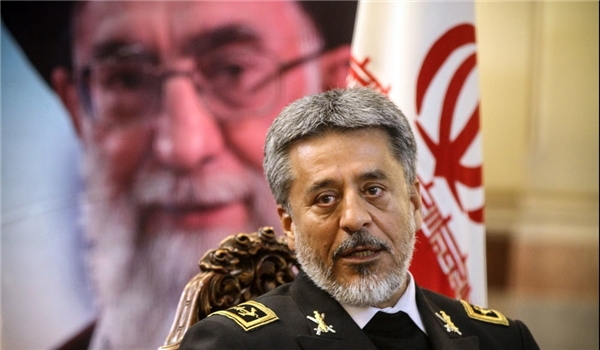Commander: Iranian Navy’s Deployment in Bab Al-Mandab A Reaction to Certain States’ Twaddle

Iranian Navy Commander Rear Admiral Habibollah Sayyari stressed his forces’ continued deployment in international waters, and said the country’s presence in Bab al-Mandab strait was a response to certain states that claimed Iranian warships have left the region after their warnings.
“The Iranian 34th flotilla of warships’ presence in Bab al-Mandab strait was a strong slap across the face of those who have uttered nonsense,” Sayyari said in Bandar Abbas port city on Monday, addressing a ceremony held to welcome the 34th fleet back home after about three months of mission in the free waters, including the Gulf of Aden and Bab al-Mandab strait.
“Many countries imagined that given the situation and conditions dominating the region, we will leave there, but we have deployed more powerful warships in there, and announced to the world that we defend the interests of the holy Islamic Republic of Iran mightily in addition to our fight against marine terrorism to establish security in shipping lines,” he added.
The Iranian Navy’s 35th flotilla of warships left Bandar Abbas port, in Southern Hormozgan province, for the Gulf of Aden on Monday to protect the country’s cargo ships and oil tankers against pirates.
The Iranian Navy’s 34th flotilla of warships left the same port for the Gulf of Aden in early April to fulfill the same mission.
In relevant remarks late April, Sayyari announced that Iranian warships are carrying out patrolling missions in Bab al-Mandab Strait, the Gulf of Aden.
“The Navy’s 34th fleet of warships is (now) conducting patrols in Bab al-Mandab Strait,” Sayyari said, addressing a ceremony in Tehran.
“We don’t enter any countries’ (territorial) waters and are present in the free waters based on the international laws and regulations,” he added.
The Navy’s 34th Fleet, comprising Alborz destroyer and Bushehr helicopter-carrier warship, was conducting anti-piracy patrols in the high seas and Gulf of Aden.
The mission of the 34th fleet lasted about three months in the Gulf of Aden and the Red Sea.
Late in April, the commander of the 34th flotilla of warships, Commodore Mostafa Tajeddini, dismissed Pentagon and US media reports that his warships were made to change their route in the Gulf of Aden after receiving warnings from the US navy ships present in the region.
“The news report by the foreign media that we have changed our route after the US fleet’s arrival is only a media ballyhoo,” Tajeddini said.
“We have had communications with many naval units since we entered the Gulf of Aden, but no country has ever dared to warn the Iranian Navy,” he added.
Also in the same month, Sayyari rejected media reports that Iran had been shooed away from the Gulf of Aden by the American warships, and stressed Tehran’s firm decision to continue deployment in the waterway to protect the country’s cargo ships from pirate attacks.
Asked about the US and Saudi Arabia’s claims that the Iranian warships planned to deliver weapons to Ansarullah revolutionary movement in Yemen when they received a warning from the US warships and left the region, he said the Iranian fleet of warships were sent to the free waters based on the international laws to protect the cargo ships and oil tankers from pirates’ attacks, and not delivering weapons to other nations.
Implying that allegations of the Saudis and Americans were not true, the Admiral reminded that he, as Iran’s Navy commander, had officially stated the mission of the Iranian fleet and the location of its mission (Gulf of Aden), and the presence and mission of the Iranian warships was completely clear and could be monitored and verified.
He also stressed that Iran would never allow anyone to inspect its ships and vessels.
“We are present in this region and provide security coverage for our ships since, anyway, it is the route for the voyage of our ships,” he said.
Stressing Iran’s firm decision to continue deployment in the international waters, including the Gulf of Aden, he said, “We would never leave the region and give up protecting our cargo ships for the sake of their words.”
He underscored that the Iranian flotilla of warships not only provides security for the country’s cargo ships but also protect other states’ ships and oil tankers from pirate attacks.
According to UN Security Council resolutions, different countries can send their warships to the Gulf of Aden and coastal waters of Somalia against the pirates and even with prior notice to Somali government enter the territorial waters of that country in pursuit of Somali sea pirates.
The Gulf of Aden – which links the Indian Ocean with the Suez Canal and the Mediterranean Sea – is an important energy corridor, particularly because Persian Gulf oil is shipped to the West via the Suez Canal.







